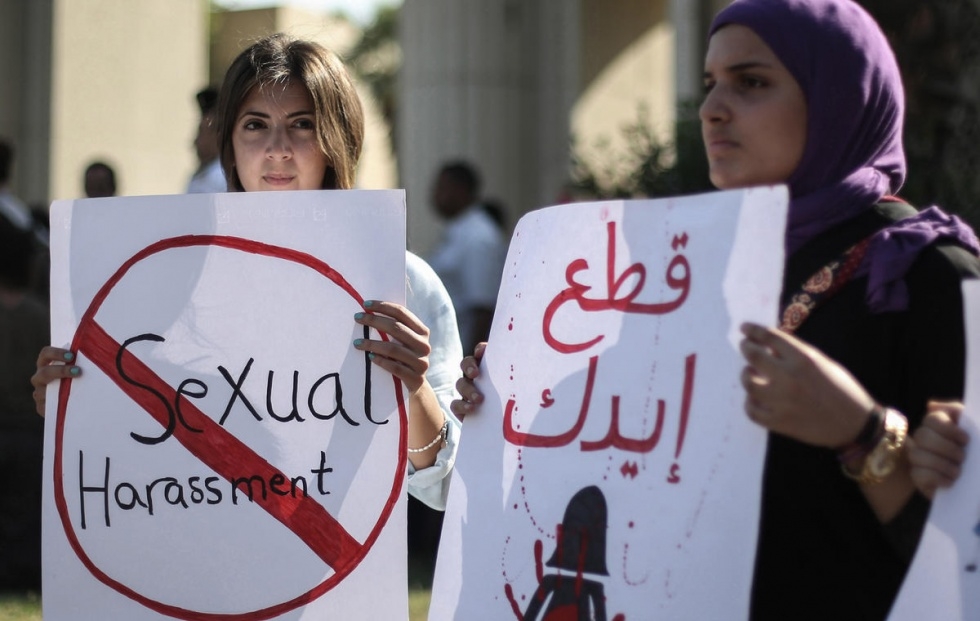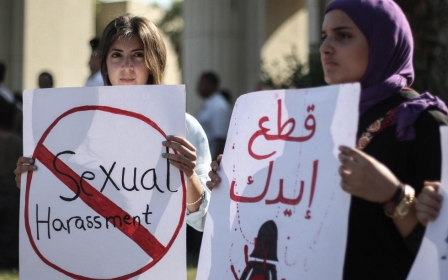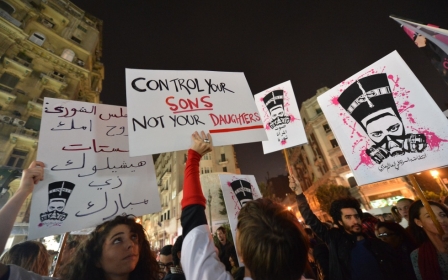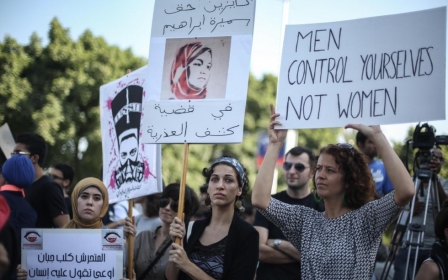Politics threaten Egypt’s anti-sexual harrassment movement

Egyptian women taking a stand against sexual harassment say while media is focusing on the issue now – following footage of a violent sexual assault in Cairo that emerged this month – that the crime is hardly a new topic in the country.
Anti-rape rallies were held in Cairo and Alexandria on 14 June by the group, “I Saw Harassment,” which had reported at least five other gang assaults on women the same night as seen on the now infamous clip.
Video Credit: Giulia Bertoluzzi, Costanza Spocci ZEERNEWS
That two-minute long cell phone footage captured a graphic attack on a 19-year old woman as she desperately attempted to escape from a group of men assaulting her during a public celebration to mark President Abdel Fattah al-Sisi’s inauguration.
The images of her naked, bruised and bloodied body have sent shockwaves throughout Egypt, prompting many social media users and local anti-assault groups to demand that something concrete finally be done to counter the epidemic of gang rapes.
Reports of sexual assaults have plagued the country since 2011, when news of the notorious attack on US reporter Lara Logan made headlines worldwide.
“Walk Like An Egyptian Woman”, a Facebook event created by Dena El-Shabba, a young university student, attracted more than 15,000 confirmations to the Cairo rally within four days of being posted. That number grew to 25,000 by the afternoon of 14 June.
An estimated 300 people attended the rally, which was located in front of the Cairo Opera House on the island of Zamalek. A large number of armed police were also present to secure the event, due to the participation of the state-run National Council for Women (NCW).
Political divisions
Some present at the rally attributed the involvement of the council to the relatively low turnout, because the NCW recently drew fierce criticism for its statements regarding the gang rapes in Tahrir Square on 14 June.
In an official statement issued on 10 June, the NCW accused “unknown parties with specific orientations and benefits” of orchestrating “such politically-oriented crimes” to “kill [Egyptian women’s] joy regarding the success of the roadmap”.
Many have perceived the statement as wrongly politicizing the sexual assaults and their victims.
“I came today because I wanted [the rally] to be big, because our politicians don’t care about an issue unless they see that the people care about it,” said Rana Ibrahim, a freelance editor who was present at the rally.
“Unfortunately it’s smaller than it should be; a lot of people left early and some groups withdrew their support in response to the NCW becoming involved, which I understand but it’s still really too bad,” she added disappointedly.
Lamia Hassan, a freelance journalist who has attended previous anti-assault protests and rallies, chose not to participate in Saturday’s event for different reasons.
“I honestly don’t care if the NCW was involved or not, if it’s for a good cause and it’s going to make a difference, then I’ll go,” she said, adding that her main issue with the “Walk Like an Egyptian Woman” rally was that it lacked any serious direction or purpose.
“People are talking about this issue like it’s something new, but it’s been happening for a long time. It’s good that people want the assaults to stop, but the fact that everyone is responding as if this was the first time a gang rape has happened is what really bothers me,” she argued.
'Not fade away'
Other participants were happy with the turnout, but echoed Hassan’s sentiment that the rally lacked direction. Hani Ashraf, who has participated in efforts alongside HarassMap and other anti-assault groups working on the ground, explained that the rally “hadn’t been what [he’d] expected”.
“I thought the message would be stronger, not in terms of the number of people but the overall message of anger. I don’t feel the anger or see it in people’s faces,” he observed as he scanned the crowd at the rally.
Although he conceded that there had been a sudden jump in societal awareness of the prevalent nature of sexual assault in Egypt. “I just hope it will stay like that and not fade away in another few days, though,” he noted sombrely.
Other attendees found the rally to be a success, however, notably Sabrina Abu Sabaa, a spokesperson for the anti-harassment group, ‘Shayfeencom’ (We Are Watching You), which participated in Saturday’s rally.
“We’re satisfied with how the event is going, this rally is different because the government has finally taken a stand, and the president has assured us that [last Sunday] was the last time any woman will be faced with such a violation,” she shouted above the noise of the surrounding crowd.
Abu Sabaa was referencing President Sisi’s statements from last Tuesday, in which he described sexual assault and harassment as “an unacceptable form of conduct, alien to the best principles of Egyptian culture”.
He also ordered Prime Minister Ibrahim Mehleb and the Ministry of Interior to focus their efforts on creating and enforcing a national strategy to tackle the problem of harassment and assault of women.
Abu Sabaa added that the “Walk Like an Egyptian Woman” rally would “not be an isolated stand against violence.”
“This is going to be a regular practice, for rallies and any other kinds of activities to raise public awareness, until laws are put into place that actually protect women and their rights, not just some pen on paper and that’s it,” she asserted.
Ahmed Gamal, a human resources specialist who was also at the rally agreed that the statements made by President Sisi signalled a shift in official policy towards the reality of sexual violence in Egypt.
“This is the first time that an Egyptian president has admitted that there is sexual violence and has vowed to do something about it,” he nodded eagerly. “That is why I came here today, because the majority of Egyptians finally care about this issue, they’re actually supporting it and want something to be done once and for all.”
New MEE newsletter: Jerusalem Dispatch
Sign up to get the latest insights and analysis on Israel-Palestine, alongside Turkey Unpacked and other MEE newsletters
Middle East Eye delivers independent and unrivalled coverage and analysis of the Middle East, North Africa and beyond. To learn more about republishing this content and the associated fees, please fill out this form. More about MEE can be found here.




